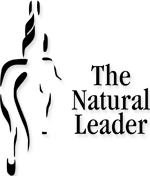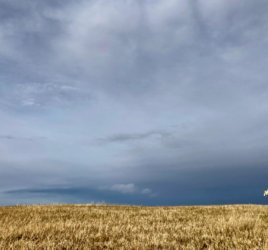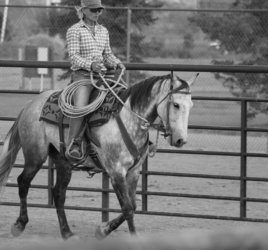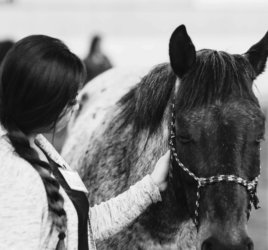For me, it is easy to get back in the saddle, it is however, more challenging to get back at the keyboard! The first half of the year for The Natural Leader has been brilliantly busy and the arrival of spring all consumed with projects that waited for six months. Early spring is the bug free season so time to catch up on those long rides!
The next conversation about leadership learning from a horse is with Luree Williamson, CEO Agriculture for Life. Luree’s life has long been influenced by horses. Her current role is dedicated to bringing a better understanding and appreciation of agriculture and it’s connection to all Albertan’s through the delivery of agriculture education and farm safety programs.

What is a key learning you believe horses have taught you about your current Leadership role?
LW – Horses will always teach you patience. Horses are great teachers on what your perception on how “it’s going to go”. I may go in with an agenda but I have to remind myself, I am Interacting with the horse so that means I have to take a step back and see what the horse’s perception of what “it’s” is. I always have to understand it is a relationship.
My career is about relationships and team work. The most valuable lesson that my horse continues to teach me as we go into the cutting ring, is that it is team work and patience. Team work and patience are two of the important lessons I have learned. It’s a negotiation.
It’s no different in the board room or the arena you are always looking to negotiate an outcome that is good for all parties. Negotiating is about relationships and finding value for all the parties involved.

Luree Williamson
Sometimes when I go into the ring I’ll almost forget it is that partnership – and I can cheat my partner if I try and control the situation. If I interfere I’m not allowing my horse to perform at their top level. So that is a lesson for me, a huge learning in that I have to trust my partner and together we can get this done.
What is the metaphor for you in the workplace?
LW – It is very similar. I work with a team of four and sometimes I have to remind myself of the complete trust I have in them. My team is absolutely wonderful at what they do. I often want to lend a hand here and there, and I have to remember that I have to let them fulfill and grow within their roles.
When you work with a team and you have that level of trust – when things work and when they don’t. How do you debrief an event?
LW – The nice thing about Cutting is you have a very short period of time so you often have the opportunity to run through the performance immediately after with your coach or herd help. We also now have video so it’s easy to review and watch to dissect the run piece by piece. When I’ve finished a run I know when I’ve messed up so it’s just a case of learning from that.
In the workplace feedback isn’t that immediate, though we are constantly reviewing our program content to make sure it’s relevant. We are constantly looking for ways to improve and strive for excellence in what we do.
Whether I am in the arena or in the workplace I am always looking for that aha moment.
In my world the relationships we have are often through sponsorship – as a charity we rely on partners, it is the good of the cause that brings us all together. So it’s the partnership and it can be incredibly inspirational and when we work as a team we can look back at what we accomplished together.
It is interesting when you begin to look at the parallels a between horsemanship and leadership. Like those days when you go to get your horse and they don’t want to be caught. I get to consider exactly what I’m doing that may be causing my horse to react that way. When I think about it I’m blessed to have a horse and that relationship where you become partners and true friends.
There is a respect between horse and rider, and that is not unlike the workplace, when there is no respect with a horse, it will literally come back to bite you at some point.
In my husband’s business we see a lot of horses where there is a lack respect – the horse will take a little bit and take a little bit and then all of a sudden there is no relationship. All of a sudden – meaning over the past year the horse has been running the show.
How does that experience show up for you in the boardroom?
When you leave the arena and debrief – You said “What could I do differently?” you have always answered what “I should do differently.”
LW – I do fault myself because I am learning and my horse knows more than I do. I look at it from the “I” perspective. Self reflective on how I as an individual can make things better. I believe as humans we are hard on ourselves wondering what we could have done better – “What did I do well what could I do differently”. The answer may be nothing, but the learning is whether it’s positive or negative.
Do you believe that is a general “we” or is it you because of your experience with horses.
Are you more reflective on the role you play because of the exposure to horses.
If there is one thing that others could learn from a horse – what one thing would it be for you?
When I’m riding I focus on one specific element and forget about everything else. The bigger picture the entire ride, when I am on a trail ride I’m so busy collecting my horse I miss the beauty around me. How do I take a deep breath and see the entire ride? How are all the elements coming together so I can enjoy the entire ride? Rather than being focused on one thing.
Getting something to happen I tend to focus on something so intently that I miss everything around me it does stress me – and the more I focus on something on a horse the more I tense up in our own body. The horse senses it and gives you feed back immediately. Every single part of my body can magnify errors. If I put to much pressure here or there it can change the outcome. I need to do better always comes in.
What kind of feedback do you get as a leader?
LW – on the horse it’s immediate. As a leader you don’t get the feedback immediately. It’s important to remember that we do need feedback and people want feedback. It’s really beneficial and once a year performance reviews aren’t enough.
 LW – I wasn’t sure what the questions might be – I had to think about it. Even through our conversation it’s been nice to be able to stop, to Whoa – release the pressure and say what am I learning. Lessons that I actually may take for granted.
LW – I wasn’t sure what the questions might be – I had to think about it. Even through our conversation it’s been nice to be able to stop, to Whoa – release the pressure and say what am I learning. Lessons that I actually may take for granted.Horses are remarkable I have the privilege of looking out the window and seeing the horses in my yard and watching their social interactions and that is an important lesson for the boardroom. For a horse being in the herd and learning to be a horse, they have to be a horse, and they have to get bitten because sometimes life bites. You got to figure this out.
Confident ,self-aware and wanting to learn more. Horses are more interested in self discovery than systems and processes. Leadership is about empowering others rather than controlling them – and when you let go of the short grasp on the lead rope, your body changes.
There is something magical about watching horses together – noticing the subtleties. Just watch them for a couple of days and that will teach you something. Getting people to notice things being aware of what is actually going on within the herd and make it relatable to your team.



